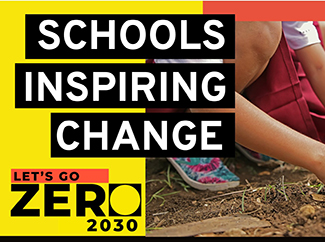consent_cookie
Duración: 1 year
Stores the user's cookie consent state
22-09-2021
Reducing your school’s carbon emissions is not as difficult as it may seem. Alex Green from the Let's Go Zero campaign outlines some inspiring and money-saving ideas to get your school started There are many ways schools can reduce their carbon impact, and just as many reasons to do so – from protecting the planet to lowering heating bills and inspiring students and their families. So what could make a big difference in your school? Here are some bright ideas from the Let’s Go Zero campaign, a movement uniting schools across the UK aiming to become zero carbon.
Let's Go Zero brings together UK schools that want to become zero emission centers by 2030. Therefore, it is a reference for the entities that participate in the Low Carbon Schools Pilot Project that the Fundación Pueblo para Pueblo has been developing since last year in the province of Yunnan, China, with funding from the European Union and the collaboration of an outstanding group of local organizations.
The school canteen
Changes to canteen food can unlock big carbon savings. North London Collegiate School has joined the No Beef Movement, taking beef and lamb off the menu because of the environmental damage these meats cause. The school also encourages less meat consumption by putting vegetarian options first on menu.
Whatever is on the menu, food waste will increase any school’s carbon footprint. St Francis Xavier School in North Yorkshire saw the financial benefit of taking action.
Former school business manager Margaret Land (now sustainability lead at the school’s multi-academy trust) explained: “In our first year of measuring we threw away a staggering five tonnes of food waste, and this cost the school £1,000 a year. In year 2 we reduced it to four tonnes and saved £500. Measuring food waste engages our students every day.”
For more on the work of St Francis Xavier School’s Eco Team see their recent article in SecEd (2021).
Green spaces
Protecting green space is another vital defence against climate change, and will bring immediate benefits to school staff and young people.
Staying at St Francis Xavier, Ms Land explained: “We have done a lot to improve and protect biodiversity and recognise nature as being an essential part of students’ mental health and wellbeing.”
At the school there are plans to create a “green corridor” around the outside of the sports field. This will include a natural pathway enabling students with disabilities to access bird feeders, hedgehog boxes and wildlife cameras.
Recycling and waste
Tackling waste is a great way to get students involved in sustainability. King’s Academy Ringmer recycles 110 tonnes of raw material each year including paper, cans, plastic, mobile phones, clothes, vegetable oil, printer cartridges and cardboard – helped by recycling bins obtained at no cost from a local brewery, and emptied by classroom eco reps.
The school is also reducing paper use– each student is given an allocation of paper for each month. Year 7s get 15 sheets and year 11s get 40.
The academy’s environmental co-ordinator, Steve Green, is an experienced school sustainability mentor with Ashden’s LESS CO2 programme. He says many of the changes that are possible in schools are about a shift in culture – something that takes time.
He adds that the savings offered by climate action are an increasingly important factor: “It’s often about doing the right thing for the budget, with an environmental benefit.”
Thinking of the future should also include preparing schools for a much warmer world. Actions like planting vegetation that grows to create natural shading for classrooms and outdoor learning areas will need to be done now so they can deliver results as temperatures rise.
The school run
Transport to and from school can create significant carbon emissions – and air pollution that threatens young lungs. Schools can take simple steps like installing bike and scooter racks, and also work with campaigning organisations like Sustrans to call for road closures that cut pollution on streets around school. Sustrans’ Bike to School Week features resources, competitions, and ways to get parents involved.
The benefits of swapping cars for walking or pedal power include better health and more focused students. A study from Scandinavia found children who walk or cycle to school, rather than being driven by their parents, are more able to concentrate in the hours afterwards (for more, see Vinther, 2021).
Goods and services
The goods and services bought by schools are another aspect of their carbon footprint. Through greener procurement, schools can use their buying power to reduce emissions. Negotiating with suppliers to clampdown on single-use plastic, buying recycled products and employing local contractors all make a difference.
Get support from others
Look at what other schools in your area are doing, the challenges they have met and how they have overcome them. Joining Let’s Go Zero will connect you with hundreds of other schools up and down the UK committed to lowering their emissions.
The campaign is also calling for more government support on this issue. However hard staff and students strive to go green, they will need our leaders to get behind them.
When it comes to practical help, there is plenty of support out there. The Transform Our World website (see further information) can help you identify what to work on next.
Conclusion
In a busy school, the number of issues to tackle can seem overwhelming. But even a few successful changes will build momentum and help get staff, students, parents and the wider school community behind further action.
Prioritise creating an action plan, so you can work towards being zero carbon by 2030. You do not need all the answers now, but ambition and commitment are crucial first steps.
As Mr Green says: “There are so many commonsense things that society can do to make significant differences. You don’t need to be obsessive about it – you just need to be sensible.”
It is a message echoed by his students at King’s Academy Ringmer: “Young people can see the reason for making fairly simple changes, and that by making them we can make significant benefits to everyone’s life.”


